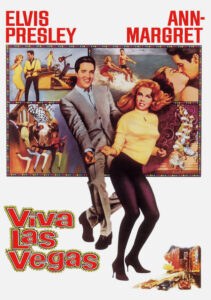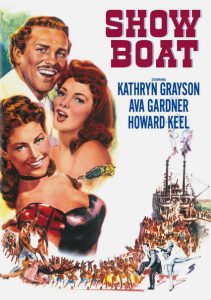Viva Las Vegas-1964
Director George Sidney
Starring Elvis Presley, Ann-Margret
Scott’s Review #1,280
Reviewed July 24, 2022
Grade: B
A lightweight romp created exclusively as a vehicle for superstar Elvis Presley and his lofty success, Viva Las Vegas (1964) is one of the better Elvis film entries.
This may not be saying much because he’s not the greatest actor in the world. He doesn’t need to be, though. He has enough charisma and chemistry with co-star Ann Margret to elicit a smile or two, and the musical numbers together and separately are entertaining.
That’s really what Viva Las Vegas is about.
Elvis was at his peak in 1964, both musically and physically, so watching the hunky singer croon, dance, and writhe with style on the big screen is not the most daunting task in the world.
The silly story feels forced, obvious, and created on the fly to provide humor, hijinks, and a bit of drama for the leads. It’s not the most substantial part of the film.
The opening camera shots of ‘old Las Vegas’ in the 1960s appeal. The lights and glitter are colorful and attractive, as is the Vegas setting. However, most of the films are disappointingly shot on a studio soundstage.
The sloppily conjured-up story involves a musically gifted race car driver named Lucky Jackson (Presley, naturally). He arrives in Las Vegas to earn enough money for a new car motor so he can win the upcoming Grand Prix race. He befriends a cagey racing rival named Elmo (Cesare Danova).
When he encounters sexy swimming instructor Rusty (Ann-Margret), he considers staying around longer to get better acquainted with the dame. After Lucky loses his winnings in the hotel pool, he’s forced to remain in Vegas, working as a waiter.
He wants to recoup his financial losses but is determined to win Rusty’s heart. Unfortunately, so does Elmo, setting off a chain of events that culminates with the Grand Prix race. Elmo and Lucky try to outwit each other.
To say the events in Viva Las Vegas are predictable is an understatement, as a meager attempt at an invested triangle between Lucky, Rusty, and Elmo is laughable. There is no doubt that Lucky and Rusty will ride off into the sunset together.
Unintentionally I am sure, director George Sidney is no Alfred Hitchcock after all, there exists homoeroticism between Lucky and Elmo. As they lie side by side under the wheels of a broken-down greaser, a titillating thought is, what if the men were to kiss?
Elvis’s enormous fan base was not ready for that scandal in 1964, so the result is a by-numbers boy meets girl, boy intends to conquer girl, a traditional love story.
Sigh.
Expecting a grand musical finale is disappointing because there isn’t one. There is only the race itself, which Rusty and company tepidly watch from an overhead helicopter.
The sequence is adequate, with enough suspense and car wrecks to enthrall the viewer, and Lucky wins the race.
In a rushed final scene, Lucky and Rusty happily emerge from a church on their wedding day. A bouquet is in Rusty’s hand, and everyone is smiling big.
The chemistry between Presley and Ann-Margret is strong and endearing. This is no surprise, given the real-life affair the pair reportedly had. Nonetheless, the sweetest number occurs early on when Lucky tries to convince Rusty, through song, that she is in love with him but doesn’t know it yet.
I gushed at the thought of Marilyn Monroe in the Rusty role, which may have been the original intent. The blonde bombshell died less than two years before the film’s release, likely after the idea was born.
No disrespect to Ann-Margret.
Of course, the main reason to watch Viva Las Vegas is for the tunes. The title track is a super-charged song about enjoying the city of sin, and other numbers appear throughout the film at breakneck speed.
This is a relief since there is little time to invest in the paper-thin plot.
Viva Las Vegas (1964) is a film mainly recommended to Elvis fans who want to see the star in his prime.

